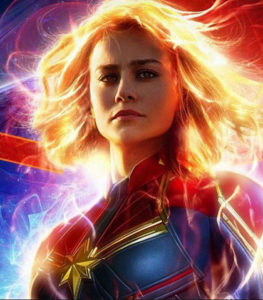Superheroes, heroism and refugees
 Heroism can be a clichéd concept. One definition says it amounts to putting others first – even at your own peril.
Heroism can be a clichéd concept. One definition says it amounts to putting others first – even at your own peril.
Another goes: ‘When the will defies fear, when duty throws the gauntlet down to fate, when honour scorns to compromise with death – that is heroism’.
So, it was interesting to see the way the idea of heroism was treated in the latest of the franchised Marvel movies.
The film, Captain Marvel, which for the first time places a female superhero at the centre of the action, diverges a little from the genre’s usual climactic notion of the heroic moment of self-sacrifice that wins the day.
Captain Marvel breaks the mold by giving the lead character played by Brie Larson a broader moral basis to her actions.
For the first half of the movie, we’re led to believe that the Skrulls are the bad guys.
Led by Talos, played by Australia’s Ben Mendelsohn, they are hunting for Dr Wendy Lawson’s (Annette Bening) research because it will allow them to reach more planets and invade them.
But midway through the movie, we learn that Talos isn’t a villain and that the Skrulls aren’t invaders. They are actually refugees who have been portrayed as villains by their enemies, the Kree.
The Skrulls are just looking for a new home, and they hope to use Lawson’s light speed technology to help them reach a new world where they’ll be safe from the Kree.
Captain Marvel resolves to not only defeat her former Kree comrades, but to protect the Skrulls and help find them a new planet.
The film has been released just as the US has drastically slashed the number of refugees it resettles each year.
According to the Washington-based Migration Policy Institute just 22,491 refugees were resettled in the US in 2018 fiscal year , about half of the 45,000 cap imposed last year by President Trump.
The number of Muslim refugees is down by 90 percent since the 2017 fiscal year, and Latin American refugee numbers are down by almost 40 percent.
Even the cap figure is a reduction from the previous years. An average of 95,000 refugees have been admitted to the US annually since the Refugee Act of 1980 was adopted. Republican presidents Ronald Reagan and George H Bush set the highest cap for refugees, at 140,000 and 142,000 respectively.
The Trump administration has cited “national security concerns” for the move but refugee advocates have accused it of xenophobia, saying that the US’ refugee vetting process is very rigorous.
Refugees are not an overt theme in the Captain Marvel film and there are no obvious real-world parallels, but the subtext is there.
The Skrulls are a vulnerable, demonised minority, who have lost their homeland.
The Kree Empire is scientifically and technologically advanced militaristic alien race bent on domination and with an uneasy alliance with Earth.
What emerges in the film is sympathy for the Skrulls and a questioning of allegiances.
When she realises the injustice that has befallen the Skulls, Captain Marvel doesn’t blindly stick with the alliance to the Kree.
She opts to go for the morally right, but more difficult, thing because the evidence shows clearly that Kree have betrayed her and also chosen war over peace.
When Captain Marvel assumes the mission of protecting refugees, it shows her heroism as underpinned by clear moral choices.
Her actions in fighting off a series of missiles fired at the Skrulls speaks less about heroism than Hollywood’s need to sell movie tickets
But her developing relationship with Talos and the Skrulls shows that true heroism is about making difficult choices.
It is a clear reminder that heroism is about helping the downtrodden rather than using them as a convenient enemy.
Laurie Nowell
AMES Australia Senior Journalist












